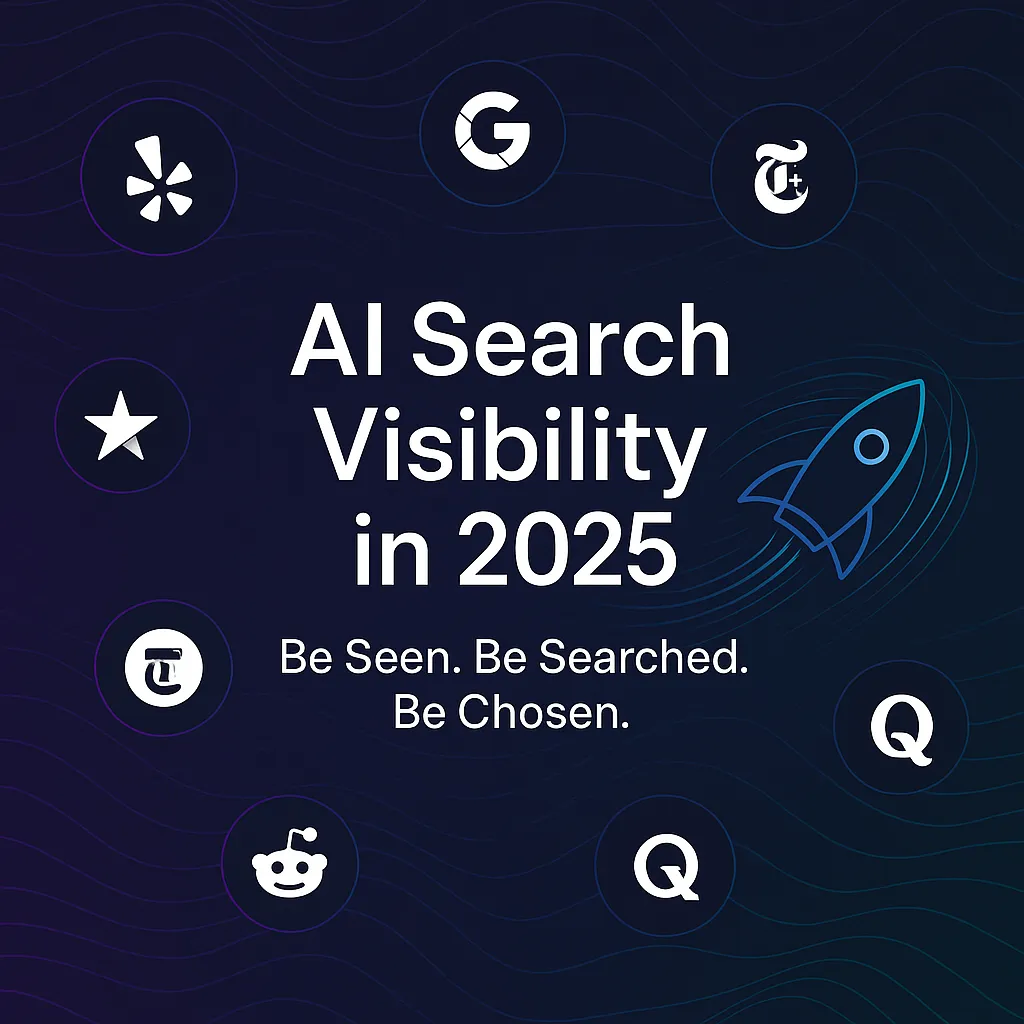
The AI Search Visibility Playbook for 2025
Be Seen. Be Searched. Be Chosen.
If your business isn’t showing up in AI-generated search results, the issue might not be your website—it could be your visibility across the web.
As generative AI tools like ChatGPT, Perplexity, Gemini, and even traditional engines like Google evolve, they’re pulling answers from a growing pool of data sources. These tools rely on structured data, trusted mentions, and signals from across the internet to determine what gets included in search answers—and what doesn’t.
Why You Might Be Invisible in AI Search
AI isn’t just reading your homepage. It’s looking for your brand across:
🗂️ Directories (e.g., Yelp, BBB)
🧩 Trusted third-party sites (Crunchbase, G2)
🌍 Review platforms (Google Reviews, Trustpilot)
📰 Media & news outlets (TechCrunch, NYTimes)
💬 Niche forums (Reddit, Quora)
If your name isn’t popping up in these places, the algorithms don’t have the data they need to trust—or include—you.
1️⃣ Build Brand Presence Where AI Looks
To get discovered, you must build a digital footprint beyond your website.
Start with:
Submitting your business to industry-specific directories
Getting active on review platforms
Answering questions in niche communities like Reddit or Quora
Pitching guest posts or seeking press mentions
Getting featured in listicles like “Best X in [City]”
Pro Tip: Run your target keyword in ChatGPT, Gemini, or Perplexity and look at the citations. If you're not included in those sources, that’s where you need to start.
2️⃣ Create Linkable Assets
Content is king—but linkable content is the emperor.
If you want to earn mentions across trusted sources, build things people want to share:
📊 Industry stat roundups
🧮 Free calculators or tools
📈 Interactive infographics
📚 Original research or whitepapers
These assets naturally get referenced and linked, earning you both trust and visibility.
3️⃣ Build Topical Authority with Content Clusters
Search engines and AI models love structured content with clear themes.
Ask yourself:
What services do we offer?
Where do we offer them?
What problems do we solve?
Then, map your site accordingly:
Build core service/location pages
Support them with clustered blog posts
Use internal linking to tie everything together
This structure helps search engines and AI tools understand your authority on specific topics.
4️⃣ Leverage Multi-Channel Content (Especially Video)
Google’s algorithms are now prioritizing video content more than ever—and AI crawlers follow that lead.
🎥 Record quick clips answering questions in your niche and distribute them to:
Instagram Reels
TikTok
Facebook Shorts
YouTube Shorts
These platforms are heavily indexed, and your short-form content can show up in both traditional and AI-enhanced search results.
📌 Pro Tip: Don’t overthink the production. Relevance and consistency matter more than polish.
5️⃣ Schema Isn’t Optional Anymore
Structured data (aka schema markup) tells search engines and AI crawlers who you are and what you do.
Without it, your site lacks context—which means lower inclusion in AI answers.
Make sure your site includes:
OrganizationorLocalBusinessschemaProduct,FAQ,Article, orServiceschemaDatasetschema if applicable
🛠 Use ChatGPT to help write your schema quickly, and validate it with Google’s Schema Markup Validator.
Final Thoughts: The AI Search Winners in 2025 Will…
✅ Appear across AI and traditional search
✅ Build trust signals on third-party platforms
✅ Create content that serves both humans and machines
Don’t wait for your competition to dominate AI search while you fade into the background. Start showing up in the right places, with the right signals, and your business will lead the pack—not just follow it.
Want help optimizing your digital footprint for AI search?
👉 Reach out and let’s make your brand visible where it counts.
